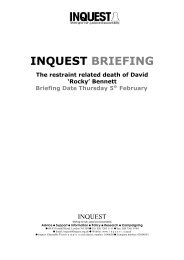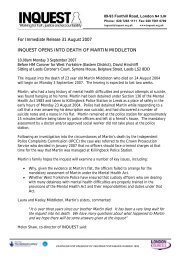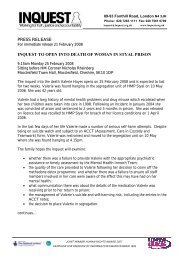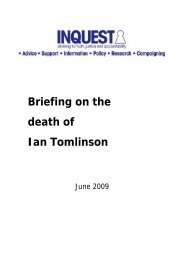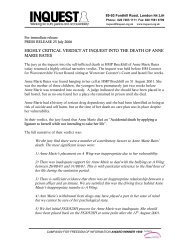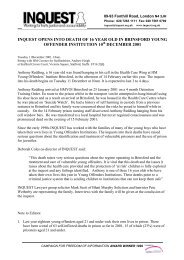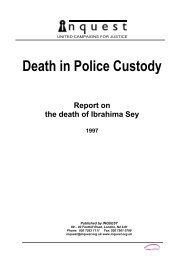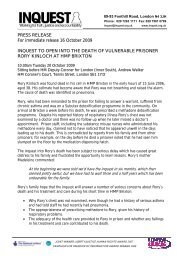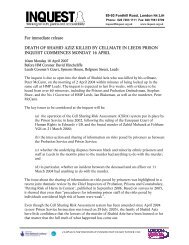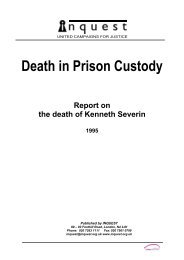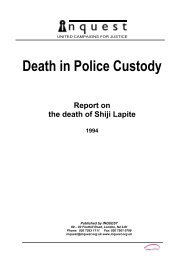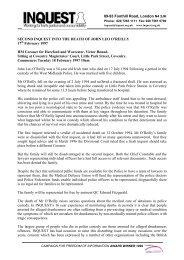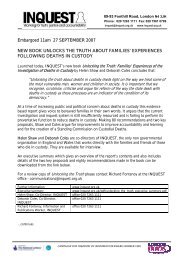Annual Report 2005 - Inquest
Annual Report 2005 - Inquest
Annual Report 2005 - Inquest
- No tags were found...
You also want an ePaper? Increase the reach of your titles
YUMPU automatically turns print PDFs into web optimized ePapers that Google loves.
INQUESTWorking for truth,justice and accountabilityANNUALREPORT<strong>2005</strong>
ABOUT INQUESTINQUEST Charitable Trust was established in 1995 to complement and assist the work of itssister organisation INQUEST which was founded in 1981. In March 2004 the twoorganisations merged into a single charitable organisation known publicly as INQUEST.INQUEST Charitable Trust is a registered charity (number 1046650) and a company limited byguarantee (number 03054853).INQUEST has a staff team of eight and is the only organisation in England and Wales whichprovides a specialist, comprehensive advice service on contentious deaths and theirinvestigation to bereaved people, lawyers, other advice and support agencies, the media, MPsand the wider public. INQUEST has a free information pack available to any bereaved familywhich explains the whole inquest process and where to find emotional and practical support.Our casework priorities are deaths in prison and police custody and in immigration andpsychiatric detention. Our focus on deaths in custody and the monitoring of such deaths meansthat we are at the forefront of uncovering patterns and trends. Arising from this we haveparticular concerns about the deaths of women, black people, children and young people, andpeople with mental health problems. This is both in terms of the treatment and care received bythe deceased in custody and the experience of bereaved relatives following the death.INQUEST develops policy proposals and undertakes research to lobby for changes to theinquest and investigation process, reduce the number of custodial deaths and improve thetreatment and care of those within the institutions where the deaths occur and that of bereavedfamilies.The INQUEST Staff and Volunteer Team <strong>2005</strong>INQUEST Charitable Trust BoardLouise Christian (Chair)Adam Sampson (Deputy Chair)Prof William Spence (Treasurer)David BergmanProf Penny GreenAdrienne JemmottRev Arlington TrotmanDr Tony WardINQUEST Advisory GroupDr Joanna BennettRaju BhattRuth BundeyJonathan GlassonDr Barry GoldsonPartner, Christian Khan SolicitorsChief Executive, ShelterDepartment of Physics, Queen Mary, University of LondonDirector, Centre for Corporate AccountabilitySchool of Law, University of WestminsterCustomer Advisor, Planning Reception,Reading Borough CouncilChief Executive, Churches Commission for Racial JusticeReader in Law, University of HullSainsbury Centre for Mental HealthPartner, Bhatt Murphy SolicitorsPartner, Harrison Bundey SolicitorsBarrister, Doughty Street ChambersSenior Lecturer, Department of Sociology,University of Liverpool2 ● INQUEST<strong>Annual</strong><strong>Report</strong> <strong>2005</strong>
Tim Owen QCProf Mick RyanMark ScottProf Phil ScratonProf Joe SimDr Richard StoneLeslie ThomasJane WinterBarrister, Matrix ChambersLaw Department, University of GreenwichPartner, Bhatt Murphy SolicitorsInstitute of Criminology and Criminal Justice,Queen’s University, BelfastSchool of Social Science, Liverpool John Moores UniversityPanel member of the David ‘Rocky’ Bennett Inquiry,President of the Jewish Council for Racial Equalityand Vice-Chair of the Runnymede TrustBarrister, Garden Court ChambersDirector, British Irish Rights WatchCo-directors – Deborah Coles and Helen ShawThe Co-directors are jointly responsible for leading INQUEST and ensuring its continuedcredibility as a high-profile human rights organisation. They are responsible for staffmanagement and supervision as well as organisational and team development. They deviseINQUEST’s strategic policy on reform of the inquest system and issues arising from casework,in particular in relation to deaths in custody, and liaise with the government – frequently atministerial level – and other relevant organisations. The Co-directors lead specific projects andundertake research to assist the organisation in achieving meaningful change in related policyand practice. They represent the organisation both orally and in writing at external events andin the media and work on individual cases ranging from inquests to evidence sessions inparliament. The Co-directors also deliver training based on INQUEST’s work to a wide varietyof audiences and edit <strong>Inquest</strong> Law magazine.Gilly Mundy – Senior CaseworkerCatherine Hayes – CaseworkerThe Caseworkers’ primary role is to advise and support bereaved families on their rights inrelation to the investigations that occur after a death. They will accompany families to meetingsas time and resources allow with lawyers and with investigators from the Prison and ProbationOmbudsman (PPO) and the Independent Police Complaints Commission (IPCC) as well asattend inquest hearings. The Caseworkers collate information gathered from previous deathsand from their experience of policy and practice and are a source of knowledge which isavailable to families and their legal teams. If appropriate they will refer or signpost families toother specialist advice agencies.Communications Officer – Marcie Shaoul (until November <strong>2005</strong>)The Communications Officer was responsible for the production of all external publications,including the annual report, newsletter and <strong>Inquest</strong> Law magazine. The CommunicationsOfficer was also responsible for writing and disseminating press releases and for mediarelations. The role included organising events, co-ordinating the volunteer scheme and workingwith the Information Worker to distribute information including updates to the website.INQUEST<strong>Annual</strong><strong>Report</strong> <strong>2005</strong> ● 3
Office Manager – Melanie Lowe (until December <strong>2005</strong>)The Office Manager was responsible for co-ordinating administrative matters, had direct inputinto fundraising and was responsible for finances for the organisation as well as having asupervisory role.Information Worker – Richard FontenoyThe Information Worker is responsible for monitoring statistics and analysis of emerging trendsin deaths in custody. This post includes provision of information and statistical analysis toINQUEST staff, outside organisations and other interested parties. The Information Worker isalso responsible for the improvement and maintenance of existing databases and overseeing thedevelopment of new systems and monitoring, managing and distributing incoming informationto the staff team.Researcher, Women’s Deaths in Prison Project – Marissa Sandler(from April <strong>2005</strong>)A temporary position as part of INQUEST’s 18 month project on women’s deaths in prison.The post involves researching the issues arising from the individual deaths and what theyhighlight about the treatment and care of women in prison and the criminal justice systemgenerally and drafting the final project report.Research Assistants –Adam Barty (until March <strong>2005</strong>)Lucie Wibberley (from June <strong>2005</strong>)The Research Assistants worked with the Co-directors on a report which examines families’experience of the investigation and inquest system following a death in custody. They analysedraw data and conducted interviews with legal and advice practitioners; summarised reports byother bodies and organisations; and helped the Co-directors with their administration needs inrelation to the project.Volunteers – Julia Bowater, Sabrina Coelho, Efstathios Divaris, Kajel Doshi,Daniel Harbord, Susan Hill, Imthiar Khan, Rebecca Linacre, Lauren McCann,Kate McGhee, Putri Mohd Najib, Joanna Peters, Shenna Thomas, FionaWallace and Lucie WibberleyThe volunteers provide vital support for the INQUEST staff team. They are an importantresource, assisting staff with tasks such as press monitoring, filing, mailings, research projectsand note-taking at inquests. The majority of the volunteers have come to INQUEST via schemesat both the College of Law and Inns Of Court School of Law in London. INQUEST was invitedto join the pro bono panel for the College of Law to help shape their volunteer scheme for theirstudents.4 ● INQUEST<strong>Annual</strong><strong>Report</strong> <strong>2005</strong>
CO-DIRECTORS’ OVERVIEW OF THE YEAR<strong>2005</strong> was another extremely busy and challenging year. Alongside the continuing high number ofdeaths in custody requiring our in-depth casework service there was an increased demand for ourviews at a policy and parliamentary level. The key themes underpinning the year have been ourcontinuing work on custodial deaths of children, young people, women and people from blackand minority ethnic (BME) communities, the treatment of bereaved families following deaths incustody and the functioning of the current investigation systems. We have raised concerns withparliamentarians, policy makers, other organisations and the media and have again seen themacknowledged and taken up by others. The work of the new bodies who assumed responsibiltyfor the investigation of deaths in police and prison custody in 2004 – the Independent PoliceComplaints Commission (IPCC) and Prisons and Probation Ombudsman (PPO) – has also comeunder greater scrutiny as the first inquests following their investigations took place. Ensuringboth organisations are aware of our concerns and those of the families we work with has beencrucial.In the first part of the year political, media and public concern about deaths in custody – inparticular of young people (see pages 7-8) and women in prison (see page 6) – continued at ahigh level but the spotlight was thrown onto the systems of investigation in an unprecedentedmanner following the shooting of Jean Charles de Menezes (see page 8). This year has also seena consolidation of the changes heralded by the Middleton judgment, notably with inquests intocontentious deaths taking longer and more narrative verdicts being returned.CHANGES AT INQUESTIn September we moved into new purpose-built offices which provide a better workingenvironment for the staff team and give us an adequate space for both team and Board meetingsand to host meetings with external visitors. Two staff members – the Office Manager, MelanieLowe and Communications Officer Marcie Shaoul – moved on at the end of the year and wethank them for their contribution to our work. As the latter post was only funded until March2006 it was not possible to recruit a permanent replacement and the role was filled by atemporary member of staff. Recruitment to replace the Office Manager proved difficult and wasonly resolved in 2006 by redefining the post as the Fundraising and Development Managerwhich added emphasis on fundraising and organisational development. Both these vacanciesaffected the organisation and placed additional strain on the small staff team who all shoulderedadditional responsibility. Despite this, the profile and reach of the organisation continued togrow, with understanding and support for our work developing to an unprecedented level.GOVERNMENT RESPONDS TO THE ROCKY BENNETT INQUIRYIn January the government finally published its response to the report of the IndependentInquiry (February 2004) into the death of David ‘Rocky’ Bennett while being restrained inpsychiatric detention. The family had to wait six years and three months to hear what actionwas proposed to prevent others dying in similar circumstances.In response to the Inquiry, the government had the chance to radically reform the delivery ofmental health services to people from black and minority ethnic communities. It was also anopportunity to stop the practice of using physical force as the first response to violence and toINQUEST<strong>Annual</strong><strong>Report</strong> <strong>2005</strong> ● 5
INQUEST’s key events in<strong>2005</strong>:January• Raised concerns aboutthe government’sresponse to the RockyBennett Inquiry <strong>Report</strong>• Addressed a meetingof the All-PartyParliamentary PenalAffairs Group on deathsin prison and theirprevention• Met Hilton Dawson MPabout Prison Is No PlaceFor Children campaign inadvance of the generalelection• Met Coroner’s ReviewTeam at the Home Office• Sarah Campbellinquest starts and lastsfor two weeks – attendedthe inquest, assisted withlegal preparation, coordinatedmedia workand supported family• Spoke at the UNISONBlack MembersConference on blackdeaths in custody.February• INQUEST LawyersGroup meeting withIndependent PoliceComplaints Commissionon investigating deathsin police custody• Met the Department ofHealth about RockyBennett Inquiry and NICEguidelines• Recruited Women’sDeaths Projectresearcher• Met officials fromCoroner Section at theHome Office for updateon current issuesconfront the currently inadequate response to staff and patient racismwithin mental health settings. We were concerned that it took aviolent death to precipitate such change and that it remained to beseen what would really happen at the point of service delivery as theissues were not new and no fundamental change had taken place inthe six years since Rocky Bennett died. Nearly a year after thepublication of the Inquiry report, there was still no standard policy onthe use of restraint across mental health and other custodial settings.INQUEST is concerned that there is no independent body toinvestigate deaths in psychiatric detention nor any central monitoringand publicly available statistics of the numbers and types of deathsthat occur. We will continue to campaign for such changes to be putin place to ensure that public servants who are entrusted with thecare of seriously vulnerable and sick people are held to account fortheir actions when someone dies in their custody.WOMEN’S DEATHS IN PRISONINQUEST remains extremely critical of the failure of the prisonservice and government to address the wider questions raised bydeaths of women in prison, particularly about the overuse of prisonfor women. A large percentage of these women are primary carerswhose imprisonment has far-reaching consequences for them, theirfamilies and society in general. Throughout <strong>2005</strong> we worked withmany of the families of the women who died and attended a numberof inquests which returned highly critical narrative verdicts.Prompted by serious concerns at the disturbing number of suchdeaths and the issues emerging at the inquests, INQUEST appointeda full time researcher in April <strong>2005</strong> to work on a Women’s Deaths inPrison Project for 18 months. The project was funded by a grant fromAtlantic Philanthropies.The project is research-based and focuses on INQUEST’sinvolvement with the families of women who have died in prisoncustody with the aim of preventing further deaths. It draws togetherthe cases and extracts relevant policy issues both on the treatment ofwomen in the criminal justice system and of bereaved people after thedeaths. The researcher has built a comprehensive database based onINQUEST’s case files, interviewed relevant policy makers andorganisations and the women’s families and friends. We hope that thereport will raise public awareness about the damaging and oftentragic consequences of imprisoning women and bring aboutfundamental changes to prevent further deaths.6 ● INQUEST<strong>Annual</strong><strong>Report</strong> <strong>2005</strong>
DEATHS OF CHILDREN IN CUSTODYINQUEST’s casework shows that child deaths in custody are oftenlinked to failings in the community and the inappropriate use of penalcustody for vulnerable children. They often receive inadequatetreatment in institutions which are unable to care for thevulnerabilities of those that they detain. Child deaths in custody raiseissues that need to be addressed through a properly resourced inquiryso that appropriate recommendations are made to ensure thatsafeguards are put in place to protect the lives of children.Work continued this year on our project covering deaths ofchildren and young people in state custody which was funded by agrant from the Diana Memorial Fund. The key areas of work on theproject are detailed below.The campaign for a public inquiry into the death of Joseph Scholes16-year-old Joseph Scholes died in HMYOI Stoke Heath in 2002. Thecoroner at the inquest into his death held in April 2004 made anunprecedented call for a public inquiry to be set up in light of theissues that had arisen at the inquest. Despite the deaths of 29children since 1990 – five of which have been since the death ofJoseph – there has never been a public inquiry into the death of achild in penal custody.The government published its response to the parliamentary JointCommittee on Human Rights’ report on Deaths in Custody inFebruary <strong>2005</strong>. In reply to the Committee’s recommendation thatthere should be a public inquiry held into Joseph’s death – a callsupported by more than a hundred MPs and peers, plus keychildren's rights and penal reform organisations – the governmentsaid that they had considered an inquiry but concluded that it wasunlikely to bring to light any additional factors not already uncoveredin the earlier investigations.On 15 March Joseph’s mother Yvonne organised a silent protestoutside the court where he had been inappropriately sentenced. Thethird anniversary of his sentencing was used to highlight the longterm and ongoing systemic abuse and deaths of children in custody.She was joined by Carol Pounder, mother of 14-year-old AdamRickwood who died at Hassockfield Secure Training Centre inAugust 2004, becoming the youngest recorded death in penal custodyin modern times. INQUEST worked with her family lawyer to raiseour concerns about his case at ministerial level.A list of signatories to the call for a public inquiry can be foundon the INQUEST website.March• Met Coroner ReformTeam at the Home Office• Draft CorporateManslaughter Billpublished and INQUESTraises concerns thatpublic bodies such asprisons are exempt fromits provisions• Met the Deputy Prison& ProbationOmbudsman• Joined IPCC AdvisoryGroup• Permission refused atHigh Court for judicialreview of the inquest intothe death of KellyPearson (death fromoverdose in 1999 of30-year old womanfollowing release fromunlawful arrest onexpired warrant)April• Women’s DeathsProject starts• Spoke at launchmeeting of ASBOConcern• Judicial Review of theinquest verdict byMetropolitan Policeofficers who shot HarryStanley dead in 1999• Spoke at theparliamentary launch ofthe Prison Is No PlaceFor Children campaignMay• Harry Stanley judgmentoverturns inquest verdictof unlawful killing,followed by threat ofstrike by MetropolitanPolice armed officers.• Met the deputyOmbudsman and thefatal incidentinvestigation team at theINQUEST<strong>Annual</strong><strong>Report</strong> <strong>2005</strong> ● 7
office of the Prison andProbation OmbudsmanJune• Crown ProsecutionService decision not toprosecute MetropolitanPolice officers involved inthe death of Kebba Jobe,the first black death inpolice custody whichwas investigated by theIPCC• The CPS re-affirm theirprevious decision that noofficers will beprosecuted over therestraint-related death ofblack man RogerSylvester in MetropolitanPolice custody in 1999.• Ran joint trainingcourse Deaths inDetention: The NewApproach for <strong>Inquest</strong>swith the Institute ofMental Health Law• Took part in Prison IsNo Place for Childrencampaign during run upto election• Co-director was amember of the judgingpanel for the Legal AidLawyer of the Yearawards• Met MPs from the Stateof Victoria on inquestsystems in UK andAustralia• Attended IPCC AdvisoryGroup meeting• Responsibility forcoroners moved toDepartment forConstitutional Affairs(DCA) from the HomeOfficeJuly• Launch of In The CareOf The State? at Housesof ParliamentINQUEST publishes book on child deaths in custodyThe key publication arising from the Diana Memorial Fund projectwas In the Care of the State? Child Deaths in Penal Custody inEngland and Wales, which was launched in Parliament in July tocritical acclaim. Written by Dr Barry Goldson and Deborah Coles,and published by INQUEST, the book provides the first detailedanalysis of child deaths in penal custody and presents key conclusionsand recommendations. These include the abolition of prison custodyfor children; a comprehensive review of child deaths in penal custody;the creation of an independent Standing Commission on CustodialDeaths; and a full public inquiry into the death of Joseph Scholes.Former HM Chief Inspector of Prisons Lord David Ramsbothamsaid at the launch: “This is a splendid book and forms the mostmomentous part of the campaign for a public inquiry.” He also saidthat he would “…entirely endorse the recommendations made inthis book… [particularly] … the need for a Standing Commission onCustodial Deaths.”Nearly 200 copies of the book had been sold by the end of the year.INQUEST continued its parliamentary and campaigning work totake forward the recommendations in the book throughout <strong>2005</strong>.INQUEST also supported the Prison Is No Place For Childrencampaign sponsored by Hilton Dawson MP in the run up to thegeneral election in May.Another child dies in custodyOn 15 September <strong>2005</strong> 17-year old Sam Elphick was found hangingin HMYOI Hindley. He became the twenty-ninth child to die in thecustody of the State since 1990.THE SHOOTING OF JEAN CHARLES DE MENEZESWidespread outrage followed the shooting dead of Jean Charles deMenezes by the Metropolitan Police on a London underground trainat Stockwell tube station on 22 July. As has happened repeatedly inprevious cases there was a pattern of misinformation in theimmediate aftermath of the shooting that attempted to deflectattention away from the actions of those who had killed Jean Charlesde Menezes, misinformation that the Metropolitan PoliceCommissioner and the IPCC chose not to correct. His death raisedmany crucial issues which INQUEST raised in its joint submissionwith the INQUEST Lawyers Group and Police Actions LawyersGroup to the Home Affairs Committee in September <strong>2005</strong>.Despite the exceptional context in which the shooting took place,it drew attention to many factors that arise following contentiousshootings by the police. In April, Azelle Rodney was shot dead by8 ● INQUEST<strong>Annual</strong><strong>Report</strong> <strong>2005</strong>
Metropolitan Police officers, and we have been working to advise andsupport his family. At the time of his death INQUEST commentedthat we had grave concerns about the increasing number of fatalshootings by police, noting that there had been fourteen since 2000,three of which were of black men. This death once again raisedserious questions about the disproportionate number of young blackmen who die following the use of force by police. In May the HighCourt overturned the inquest verdict of unlawful killing in the deathof Harry Stanley, following threatened strike action by MetropolitanPolice armed officers.POLICY AND PARLIAMENTARY WORKThroughout <strong>2005</strong> we briefed parliamentarians and policy makersabout the issues emerging from our casework.Deaths in CustodyIn June the House of Lords debated the government’s response to theJoint Committee on Human Rights report on Deaths in Custodypublished in December 2004. Many of the issues we had raised werealso raised by members of the Lords in their criticisms of thegovernment response.INQUEST produced a parliamentary briefing on self-inflicteddeaths in prison and prison overcrowding which informed a House ofLords debate on suicide in prisons in October <strong>2005</strong>. The briefingdrew attention to the contribution to these deaths of inadequate carefor the vulnerable: those with mental health problems, drug oralcohol problems, victims of physical and sexual abuse, individualstargeted for bullying once in prison and children unable to cope withseparation from their family and the demands of a brutal custodyregime. It also pointed out that inadequate care is regularlycompounded by systemic neglect: inadequate attention to healthrecords, failure to share paperwork that identifies an individual’s highrisk of self-harm or suicide, lack of communication between staffwithin the prison, failure to provide adequate detoxification for newprisoners with a drug or alcohol problem, lack of training in suicideawareness and failure to implement suicide prevention policies, use ofsegregation for those at risk of suicide and self harm, and failure toidentify and address systematic bullying.We argued that evidence arising from inquests into deaths incustody points increasingly to the fact that the system is not, in itspresent form, able to meet the duty of care that it has to vulnerableprisoners, thereby breaching the state’s obligations under article 2 ofthe Human Rights Act 1998. The breach is compounded by the state’sfailure, because of the problems with the inquest and death• Attended MinisterialRound Table Group onSuicides in Prison• Spoke at Capitaconference on deaths ofwomen in prison• Coroners reformmeeting at DCA• Shooting of JeanCharles de Menezes atStockwell Undergroundstation in South LondonAugust• Spoke at meeting onwomen in the criminaljustice system at theFawcett Society• Carol Pounder, motherof Adam Rickwood,made a sponsoredparachute jump andraised £721 for INQUEST• Following the shootingof Jean Charles deMenezes we held ameeting with adelegation from theBrazilian government –including a senior federalprosecutor, the director ofthe Department for theBrazilian CommunitiesAbroad and the deputydirector of theDepartment ofInternational Legal Cooperationof the Ministryof Justice – to outline theprocess which followspolice shootings.September• INQUEST moves tonew offices• Asked to make astatement in the case ofPrisoner “D” as part of aHigh Court judicial review(man in persistentvegetative state followingan attempt to take his ownlife at HMP Pentonville)INQUEST<strong>Annual</strong><strong>Report</strong> <strong>2005</strong> ● 9
• Attended seminar atthe Fawcett Society’sCommission on Womenand the Criminal JusticeSystem on womendefendants and offenders• Attended IPCC AdvisoryGroup meeting• Submitted evidence tothe Zahid MubarekInquiry• Spoke at Law Societymeeting on the impact ofthe Middleton judgmenton the inquest system• INQUEST’s LateSummer Reception at theOctober GalleryOctober• Held joint ILG andPolice Action LawyersGroup special meetingon police use of force• Spoke at NorthernIreland Human RightsCommission conferenceon women in prison inBelfast• CPS decides noofficers will be chargedover the fatal shooting ofHarry Stanley• Spoke at Nacroconference on reducingcustody for young peoplewho offend• Spoke at publicmeeting on deaths inimmigration custodyorganised by Bail forImmigration Detainees(BID)• Attended the UnitedFriends and FamiliesCampaign’s annualremembranceprocession of relatives ofpeople who have died incustody from TrafalgarSquare to 10 DowningStreetinvestigation system, to adequately investigate and learn from eachdeath in order to protect the lives of others. We argued that for thesereasons the inquest system is unable to draw parallels between casesand track similarities and themes of bad practice which could bereformed, and of good practice that can be replicated. Repeating therecommendation made in our book In the Care of the State? we calledfor a Standing Commission on Custodial Deaths which would bringtogether all of the experts in the field, together with evidence collectedfrom the separate investigation bodies in one place to investigatedeaths in custody. Its purpose would be to identify the failings as wellas moderate achievements of the present system and makerecommendations by looking beyond individual deaths and/orparticular state agencies at the common concerns that link each death.Prison Health CareWe briefed members of the House of Lords on the issues arising fromour casework for a debate on prison health care in November andhighlighted the following issues: access to medical services,psychiatric services, detoxification facilities, quality of medical staffand the role of Primary Care Trusts. We gave case examples toillustrate our concerns, one of which was quoted by Lord Chan, whosaid:“On the plans for provision of healthcare in prisons through theNHS, the PCT-Prison Partnership Board is the body that takesresponsibility for deciding how best to provide prison health careservices. There has been no clear evidence of improvement or goodpractice in prison health since the changes made in April 2003.<strong>Report</strong>s of problems in healthcare appear to be no different frombefore the PCTs took over commissioning for prison health. The lackof change suggests that prisoners are not being offered the samequality of care we would expect from the NHS outside of prison.For example, a 40 year-old man died of a suspected heart attackon 28 April <strong>2005</strong> in Her Majesty's Prison Frankland. At 9.30 am, hecomplained of chest pains to his mother by telephone. Sheencouraged him to see a doctor, but he said that it was impossible toaccess medical care. Eventually, he was able to see a doctor at 3.45pm, but the prison doctor saw nothing of immediate concern and theman was not placed in the healthcare centre of the prison. He againcomplained of increasingly severe chest pain, but he was told to seethe doctor on the following day; but that evening he was foundcollapsed in his single cell by a fellow prisoner who raised the alarm.His mother has understandably raised a number of issues about thisprisoner's healthcare and whether early intervention could haveprevented his death.”10 ● INQUEST<strong>Annual</strong><strong>Report</strong> <strong>2005</strong>
Prison OvercrowdingIn November INQUEST gave written and oral evidence to the HomeAffairs Committee on our concerns about deaths in prison. TheCommittee had decided to take evidence on Prison Suicides andOvercrowding. The aim of the session was to explore the reasons forthe recent increase in self-inflicted deaths in prison and what can bedone to reverse the trend, taking into account the current level ofovercrowding. It was a one-off session and not part of a widerinquiry.We gave evidence alongside the Prison Reform Trust, the HowardLeague for Penal Reform and Pauline Campbell, the mother of ayoung woman who died in prison. We drew attention to many of theconcerns we had briefed members of the House of Lords about fortheir debate on suicide in prisons in October. In particular membersof the committee wanted INQUEST’s views on the new policies andinitiatives of the government and we were able to draw attention tothe disparity between the paper policies and their implementation. Indiscussing the new system for assessing whether prisoners were atrisk of self-harm or suicide we said the following:“It is another example of something that looks very good onpaper...It is a new form, it requires another layer of assessment andit talks about the importance of assessors who carry out the in-depthscreening of vulnerable prisoners. The concern is, in terms ofovercrowding and the impact on staff time, whether or not staff aregoing to have the time to implement the policy as it is written onpaper.”Corporate ManslaughterINQUEST worked with Centre for Corporate Accountability incommissioning a legal submission to the Home Affairs Committee’sscrutiny of the draft Corporate Manslaughter legislation in March,drawn up by INQUEST Lawyers Group members Tim Owen QC andHenrietta Hill. We also briefed the Prison Reform Trust (PRT) beforethey gave oral evidence to the Home Affairs and Work and PensionsSub-Committee on the draft Corporate Manslaughter Bill inNovember. The PRT shared our concern that the police and prisonservice should not be exempt from prosecution for deaths, even if adeath takes place as a result of gross failures by senior management.In our view deaths in prison and police custody which could be theresult of negligence should be subject to police investigations andpossible prosecutions in the same way as any other organisation.November• Gave evidence toHome Affairs Committeehearing on prisonovercrowding• Attended the NacroAGM• Attended astakeholders meeting atthe DCA on a proposedfamily charter forbereaved people• Briefed Prison ReformTrust to inform theirevidence to the HomeAffairs and Work andPensions SelectCommittee hearing onthe Draft CorporateManslaughter Bill• Attended Women InPrison AGM• Met Harriet Harman QCMP, Minister of State atthe DCA, on reform of thecoroner’s inquest system• Presented paper atCentre for Crime andJustice Studiesconference on deaths incustody• Spoke at Children’sRights Alliance meetingon deaths of children incustody• Spoke at Capitaconference on deaths inpolice custody• Unsuccessful JudicialReview at High Court ofgovernment’s decisionnot to hold a publicinquiry into the deathJoseph Scholes.December• Spoke at Deepcut andBeyond meeting on legalaid for inquests• Attended IPCC AdvisoryBoard meetingINQUEST<strong>Annual</strong><strong>Report</strong> <strong>2005</strong> ● 11
Casework ServiceThe aim of our casework service is to advise families and empower them through the provisionof information and advice about their rights. Because of the length of time from the death to theconclusion of the investigation and inquest process our support can last for a number of years.In <strong>2005</strong> the casework team dealt with a total of 312 cases, with 97 of these brought forwardfrom previous years. This workload generated close to 2,400 casework-related telephone calls.General Advice<strong>2005</strong> was the first full year providing service with two full-time dedicated caseworkers whichhas enabled us to attend more inquests and to make contact with and provide advice to agreater number of families. Although the new caseworker was in post from September 2004,we were still able to provide the in-depth service described in only a relatively small number ofcases.We operate a telephone-based service offering free support, advice and information on theirbasic rights in the coroner’s court to all bereaved people facing an inquest. There is no otherorganisation in England and Wales with such specialist knowledge about the inquest system.People contacting our informed casework team have access to our comprehensive InformationPack and leaflets concerning specific details of both deaths in prison and police custody.INQUEST also provides information to bereaved people about how to access other services andin many non-custody related deaths we will provide both advice and referrals to otherorganisations. For example, road traffic related deaths are referred to RoadPeace, work relateddeaths to the Centre for Corporate Accountability and deaths in hospital to Action againstMedical Accidents (AvMA) for specialist advice and support. We also monitor legal issuesarising from these cases that concern the inquest system.Deaths in CustodyINQUEST provides an in-depth casework service when an inquiry falls within one of ourpriority areas – prison and police custody and psychiatric or immigration detention. Our serviceinvolves arranging legal representation for a family and/or other bereaved people and thenworking as an integral part of the legal team, advising and supporting lawyers and providingdetailed background information on similar cases. We ensure that families have access to ourpool of experienced lawyers who in turn brief us on any issues arising from the death and itsinvestigation. In a proportion of cases we arrange meetings with MPs, carry out press andmedia work, attend the inquest and follow up on the issues that emerge. The latter can includeverbal and written submissions to parliamentary inquiries and the production of briefing papersas well as supporting individual family campaigns. However, because of the high number ofprison deaths in particular during <strong>2005</strong> it was not possible to provide this level of service in allcases due to the small size of our staff team.In November <strong>2005</strong>, we learned that we were successful in our application to the Big LotteryFund for our project Responding To Bereaved Families – Improving The <strong>Inquest</strong> andInvestigation System. This will allow us to expand our casework team to three, which willenable INQUEST to provide an in-depth service to many more bereaved people.12 ● INQUEST<strong>Annual</strong><strong>Report</strong> <strong>2005</strong>
Police 39(New 18BroughtForward 21)Prison 131(New 72BroughtForward 59)INQUESTCases<strong>2005</strong>Total: 312New: 215Brought forward: 97Other 142(New 125BroughtForward 17)Cases brought forward from previous years form asignificant part of our caseload. Sometimes a casecan involve work by inquest with families and theirlegal teams for many years before, during and afterthe inquest proceedings themselves.Newclients348INQUESTservice users<strong>2005</strong>Total: 664BroughtForward316INQUEST’s service users include bereaved peopleand their legal representatives.<strong>Inquest</strong>s <strong>2005</strong>:This list shows the inquestswhich have taken place in<strong>2005</strong> where we have workedto advise the family and ortheir lawyers. As the sectionon casework shows, we tryand ensure that we raise theissues arising from inquestsat a policy andparliamentary level. In allcases we monitor, collateand analyse inquest findingsand verdicts.January• Sarah Campbell (self-inflicteddeath of 18-year old woman atHMP Styal in 2003)• Kebba Jobe (restraint-relateddeath of black man inMetropolitan Police custody in2004)• April Sherman (self-inflicteddeath of 27-year old woman inEdmunds Hill Prison in 2004)February• Paul Day inquest opens (selfinflicteddeath in segregation unitof mixed-race man at HMPFrankland in 2002)• Helena Price (self-inflicteddeath of 27-year old woman inNew Hall Prison in 2003)• Jolene Willis inquest (selfinflicteddeath of young womanat Styal prison in 2003)• Kwame Wiredu inquest (deathof black man in MetropolitanPolice custody in 2002)• Hayley Williams inquest (selfinflicteddeath of 41-year oldwoman at HMP Styal in 2003)• Julie Lewis inquest (death ofwoman at HMP Eastwood Parkin 2004)• Stephanie Horrocks (non-selfinflicteddeath of 27-year oldwoman in Eastwood Park Prisonin 2004)• Alan Brittan (self-inflicted deathof 56-year old man inBirmingham Prison in 2003)• Steven Hampson (self-inflicteddeath of 19-year old man in2002 at Hindley YOI)• Kevin McSweeney (self-inflicteddeath of 35-year old Irish man inWandsworth Prison in 2003)• Fiona Gale (self-inflicted deathof female detained psychiatricpatient in 2004)March• Paul Day inquest verdictreturned• Ann-Marie Bates inquest (selfinflicteddeath of young womanin Brockhill Prison in 2001)opened and then adjourned• Rickki Scears (self-inflicteddeath of 42-year old man inWandsworth Prison in 2004)• Christopher Hewitt (selfinflicteddeath of 50-year oldman in psychiatric detention in2004)INQUEST<strong>Annual</strong><strong>Report</strong> <strong>2005</strong> ● 13
April• Julie Walsh inquest (selfinflicteddeath of woman at Styalprison in 2003)• Stuart Horgan (self-inflicteddeath of 39-year old man inWoodhill Prison in 2004)• Nariman Tahmasebi (selfinflicteddeath of Iranian man inLewes Prison in 2002)• Julie Lewis (non-self-inflicteddeath of 44-year old woman inEastwood Park Prison in 2004)May• Elmas Ozmiko inquest (deathof asylum seeker in immigrationdetention at Dover in 2003)• Joey Jackson inquest(restraint-related death of man inEssex police custody in 2002)• Maurice Skinner (self-inflicteddeath of 52-year old manaboard The Weare prison ship in2004)June• Keith Larkins inquest (manshot dead by Metropolitan Policein 2003)• Tina Bromley inquest (selfinflicteddeath of 37-year oldwoman in Edmunds Hill prisonin 2004)• Sue Stevens inquest (selfinflicteddeath of 48-year oldwoman in HMP Durham in2003)• Emma Levey inquest (selfinflicteddeath of 25-year oldwoman at HMP Downview in2003)• Miranda Cox (self-inflicteddeath of 41-year old woman atNew Hall Prison in 2002)• Colin Holcombe (death of 50-year old man in Wiltshire Policecustody in 2003)• Brian Carter (self-inflicteddeath of 34-year old man inShrewsbury Prison in 2004)• Steven Davies (self-inflicteddeath of 49-year old man inPentonville Prison in 2004)• John Chester (self-inflicteddeath of 26-year old man inpsychiatric detention in 2004)July• Dimuka Bijoux inquest (deathof Congolese asylum seeker atHaslar Detention Centre in 2004)• John McFarlane (self-inflicteddeath of 26-year old man in HMPLiverpool in 2003)September• Daniel Mootaz inquest (deathfrom overdose of mixed-raceman in HMP Parkhurst in 2003)• Hugh Edwards (self-inflicteddeath of 30-year old man in HMPThe Verne in 2004)• Terry Sawford (self-inflicteddeath of 23-year old man in HMPNottingham in 2004October• Trial of officers in RobinGoodenough case (man whodied following contact withOxfordshire police officers)• Marcus Downie Junior inquest(self-inflicted death of 20-yearold mixed-race man in HMPChelmsford in 2002)• Vincent Shem inquest (selfinflicteddeath of 32-year oldGhanaian man at HMPWandsworth in <strong>2005</strong>)• Kwame Wiredu inquest (deathof 25-year old black man inMetropolitan Police custody in2002)• Carol Savage (self-inflicteddeath of 50-year old woman inpsychiatric detention in <strong>2005</strong>)November• Fosta Thompson inquest (20-year old black man shot dead byMetropolitan Police in 2002)• Daniel Sutcliffe inquest(restraint-related death of man inpsychiatric detention in 2002)• Andrew Barclay inquest (selfinflicteddeath of 20-year oldman in HMP Norwich in 2003)• Stephen Green inquest (selfinflicteddeath of 34-year oldman in HMP Leicester in 2004)• John Baxter inquest (selfinflicteddeath of 25-year oldman in HMP Hull in 2004)• Wendy Booth inquest (selfinflicteddeath of woman in HMPDurham in 2003) opens• Jessica Adam inquest (selfinflicteddeath of young womanin HMP New Hall in 2003)• Philip Prout inquest (53-yearold man shot dead by Devon &Cornwall Constabulary in <strong>2005</strong>)• Stephen Marsden inquest(death of 56-year old man inWest Yorkshire Constabularycustody in 2001)• Brian Brown inquest (death of69-year old man in LittleheyPrison in <strong>2005</strong>)• Phillip Powell inquest (death ofman hit by taxi while beingchased by Cheshire Policeofficers in 2003)December• Hannah Kirkham inquest (selfinflicteddeath of young womanfollowing bullying at work)• Wendy Booth inquestconcludes14 ● INQUEST<strong>Annual</strong><strong>Report</strong> <strong>2005</strong>
INQUEST Lawyers GroupThe INQUEST Lawyers Group (ILG) is a national pool of committed, experienced barristers,solicitors and law students – including the leading inquest and human rights practitioners in thecountry – who provide preparation and legal representation for bereaved families at inquests.We work in partnership with the ILG to provide our high-quality casework service, workingtogether on procedural and tactical matters.ILG members have access to an email group in which ideas and questions are discussed andinformation on developments in inquest law is exchanged. Members receive <strong>Inquest</strong> Law, theonly specialist journal of its kind, published three times a year and also available to nonmembersubscribers. The journal is edited by the INQUEST staff team and is written bymembers of the ILG and other invited parties. A number of coroners have subscribed, and themagazine has received praise for its coverage of significant cases, inquests and judgments.INQUEST<strong>Annual</strong><strong>Report</strong> <strong>2005</strong> ● 15
Statistics and MonitoringINQUEST is the only independent organisation in England and Wales to collate statistics ondeaths in custody. We monitor all deaths in custody and identify themes, trends and patternsthat arise from these deaths and our casework priorities reflect these concerns.Our statistics are aggregated from casework and information received from official andother sources and are used widely across the media. Although the statistics are regularlyupdated on our website, we will often get requests for specific statistics regarding a particularinstitution or type of death.During <strong>2005</strong> there were 174 deaths in prison in England and Wales. Of these, 7 werewomen, 14 were young people and 29 were from Black and Minority Ethnic (BME)communities. There were 48 deaths in police custody in England and Wales in <strong>2005</strong>, whileanother 45 deaths occurred as a result of Police Vehicle Incidents (PVIs). Seven were deaths ofBME people, in custody or as a result of police shooting, with 5 of these involving theMetropolitan Police.Up to date detailed figures of deaths in prison and police custody by year is available on ourwebsite.Information PackINQUEST’s comprehensive and highly-regarded Information Pack is freely available on ourwebsite, and was downloaded over 3,800 times in <strong>2005</strong>. There were nearly 66,000 visitorslogged to the website overall in <strong>2005</strong>.INQUEST telephone work <strong>2005</strong>Other 653 (11%)Communications 310 (5%)Admin 1,023 (17%)Total6,025Casework 2,376 (39%)Policy 484 (8%)Media 1,005 (17%)Information 113 (2%)Funding 61 (1%)16 ● INQUEST<strong>Annual</strong><strong>Report</strong> <strong>2005</strong>
Treasurer’s <strong>Report</strong> for the year ended 31 March <strong>2005</strong>For INQUEST <strong>2005</strong> has been a year of consolidation. Income increased largely because of thelarge grant from Atlantic Philanthropies that we actually received in our 2004 financial year.We continued to monitor our expenses closely and were able to end the financial year to March<strong>2005</strong> with a net income of £82,598 enabling us to increase our unrestricted funds by almost£30,000 to £47,000.The enormous amount of work that our staff team has been able to deliver has been due inlarge part to the generous donations of our funders, and we are grateful for their support.During the year, we received funding from the Association of London Government, the AtlanticPhilanthropies, Two Garden Court, the Department of Health, the Diana, Princess of WalesMemorial Fund, the City Parochial Foundation, the Tudor Trust, the Joseph RowntreeCharitable Trust and Action for Prisoners Families. We also would like to recognise thesignificant contributions made by our subscribers and well-wishers.Through the year, our staff team has been ably supported by a number of volunteers whosein kind support has been invaluable to the service that we have been able to provide in <strong>2005</strong>.INQUEST<strong>Annual</strong><strong>Report</strong> <strong>2005</strong> ● 17
INQUEST CHARITABLE TRUSTSTATEMENT OF FINANCIAL ACTIVITIESFOR THE YEAR ENDED 31 MARCH <strong>2005</strong>Summary Income and Expenditure AccountRestricted Unrestricted Total TotalFunds Funds <strong>2005</strong> 2004£ £ £ £Incoming ResourcesGrants 200,488 1,000 201,488 363,402Deferred from last year 158,785 - 158,785 -Deferred to next year (5,861) - (5,861) (158,785)Donations - 15,007 15,007 15,497Memberships - 8,196 8,196 7,364Other Income - 3,043 3,043 2,443Investment Income - 3,974 3,974 655Total Incoming Resources 353,412 31,220 384,632 230,576Resources ExpendedCosts of Generating Funds: 8,166 - 8,166 6,497Direct Charitable Expenditure:Project Costs 240,742 - 240,742 200,366Support Costs 46,205 - 46,205 34,760Other Expenditure:Management & Admin 4,779 2,142 6,921 8,534Total Resources Expended 299,892 2,142 302,034 250,157Net Incoming/(Outgoing)Resources for the Year 53,520 29,078 82,598 (19,581)Fund Balances BroughtForward at 1 April 2004 37,319 17,922 55,241 86,417Transfer from <strong>Inquest</strong> - - - (11,595)Fund Balances CarriedForward at 31 March <strong>2005</strong> 90,839 47,000 137,839 55,24118 ● INQUEST<strong>Annual</strong><strong>Report</strong> <strong>2005</strong>
INQUEST CHARITABLE TRUSTBALANCE SHEET AS AT 31 MARCH <strong>2005</strong>Statement by Auditors:As auditors to the charity we have reviewed the summarised accountsabove and consider that they are consistent with the full accounts, onwhich we gave our opinion.Barcant Beardon LLPChartered Accountants and Registered Auditor8 Blackstock MewsIslingtonLondonN4 2BT<strong>2005</strong> 2004£ £Fixed Assets 6,090 3,042Current AssetsDebtors and Prepayments 18,597 19,656Cash at Bank and in Hand 134,939 217,654153,536 237,310Creditors: Amounts falling due within one year (21,787) (185,111)Net Current Assets 131,749 52,199Total Assets less Current Liabilities 137,839 55,241ReservesRestricted Funds 90,839 37,319Unrestricted Funds 47,000 17,922137,839 55,241Statement by Trustees:The above accounts are a summary of information extracted from theaudited annual accounts, on which the auditor’s opinion was unqualified.The full report and accounts were approved by the board of trustees on21 December <strong>2005</strong> and have been submitted to the Charity Commission.These summarised accounts may not contain sufficient information toallow for a full understanding of the financial affairs of the charity. Forfurther information and copies of the accounts, please contact INQUEST.INQUEST<strong>Annual</strong><strong>Report</strong> <strong>2005</strong> ● 19
INQUESTWorking for truth,justice and accountability• Advice • Support • Information• Policy • Research • Campaigning89-93 Fonthill Road, London N4 3JHTel: 020 72631111 Fax: 020 7561 0799Email: inquest@inquest.org.ukWebsite: www.inquest.org.ukCopyright and published by INQUEST 2006ISBN 978 0 9468 5820 0Designed by Smith+Bell Design (andymss@aol.com)Printed by Oldacres Ltd, London EC1



